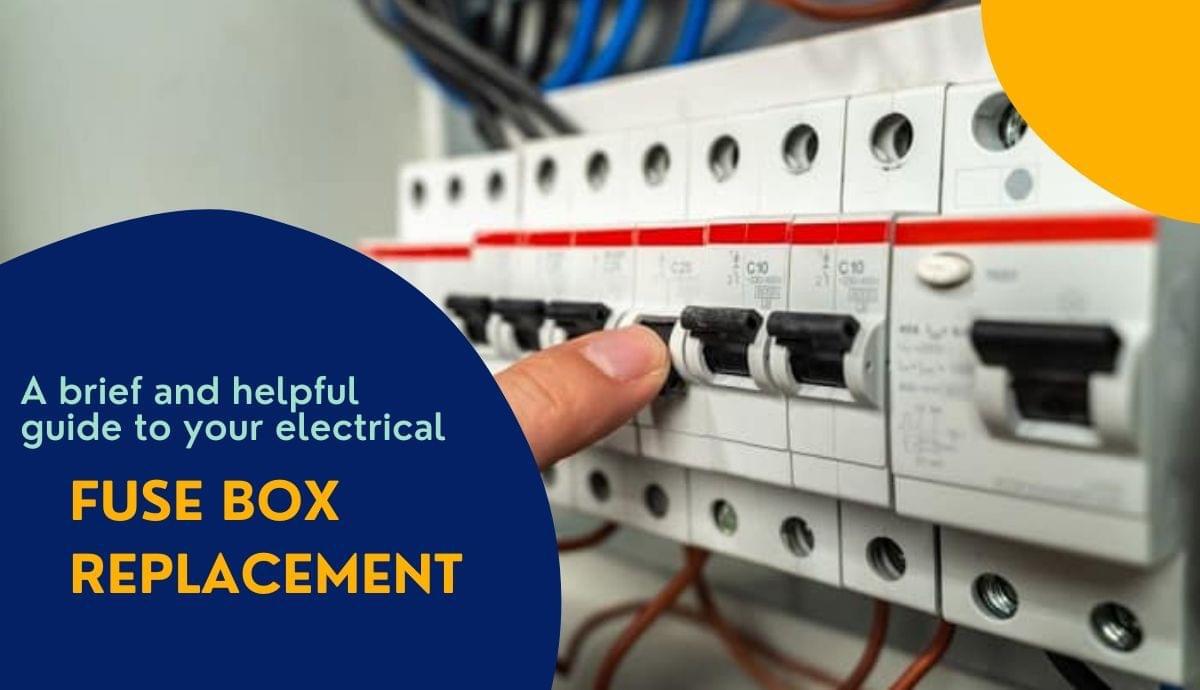The Life Of Any Fuse Box Is Limited And It Will Never Last An Eternity. So, If Your Fuse Box Has Already Served You For Years At A Stretch Then It Is Better To Be Prepared For Its Replacement Sooner Or Later. But Even If Your Fuse Box Is In A Sound Working Condition, You May Still Have To Replace It Anyway Because Circuit Breakers Are More Efficient As Well As Reliable In Handling The Steadily Rising Need For Electricity In Modern Homes Compared To Fuse Boxes. Compared To Fuse Boxes, Circuit Breakers Also Last Much Longer.
Replacing A Fuse Box Requires A Charge And This Cost Varies Widely From Case To Case. This Charge Is Determined By Electricians And Is Guided By A Few Factors. The Factors Include The Location And Amperage Of The Fuse Box Or Consumer Unit You Are Replacing And Whether There Is A Requirement To Installing Additional Electrical Outlets Or Subpanels Within The Property.
But First, Let Us Look At The Average Cost Of Replacing A Fuse Box.
- As Far As The UK Is Considered The Average Cost Of Replacing A Fuse Box Is Around £1,100.
- The Maximum Price That You May Have To Pay For The Service Is Around £2,000.
- The Lowest Cost That You May Have To Pay For The Same Is Within The Range Of £350 To £400.
The Costs Mentioned Above Include Both The Price Of The Parts And The Labour. Replacement Of A Fuse Board Is Most Likely To Be Higher If You Want A New Subpanel Installed. People Usually Want To Install New Subpanels. In These Cases, To Smoothly Accommodate New Electrical Connections. Depending On The Amount You Choose For Your New Sub Sub-Panel And The Number Of Sub-Panels You Want. The Cost May Go Up Anywhere Within The Range Of £400 To £1,800 In Addition To The Cost Of Replacing The Safety Device.
Understanding The Necessity Of A Fuse Box
A Fuse Box Is Nothing But An Electrical Panel That Is Made Up Of Fuses To Distribute Electricity Throughout Your Premise Or Property. Most Usually When Someone Says Fuse Box, The Chances Are Higher That The Individual Is Actually Referring To An Electrical Circuit Breaker. The Terms Fuse Box And Consumer Unit Are Used Interchangeably Although The Two Are A Little Different. A Fuse Box Is Comprised Of Fuses Whereas A Circuit Breaker Has No Fuse In It But Has Switches. However, It Is Important To Note That Both A Fuse Box And A Circuit Breaker Perform The Same Task Or Shoulder The Same Responsibility. Both Devices Smoothly Distribute Electricity Across Your Home, Office, Property Or Premise.
A Fuse Box Is An Electricity Solution From The Past Whereas A Circuit Breaker Is A Modern Solution. This Is Why Fuse Boxes Often Fail To Handle Larger Amount Of Electrical Activities In Modern Homes And So One Needs To Replace An Existing Fuse Box With A Consumer Unit Or CU To Ensure Electrical System Runs Smoothly And Safely Across The Property Without Any Hindrance Says An Electrician Who Deals With Fuse Box Replacement At Homes In London Over The Years.
Replacing a fuse box – safety comes first
A Fuse Box Or A Circuit Breaker Shoulders The Responsibility Of Handling Electricity In Your Property Or Home And Electricity Is Potentially Dangerous. Considering These Facts It Is Best To Hire A Licensed Electrician For This Job. A Qualified And Competent Electrician Is Also Familiar With Your Local Electrical Codes And Regulations. As A Result, The Task Will Be Much Safer And Proper Compared To Your DIY Effort. It Is Important To Remember That When Electrical Panels Are Replaced Or Installed Improperly There Is Always A Massive Chance Of Electrical Hazards Like Fires And Shocks.
For A Trained Pro, The Overall Process Of Fuse Box Replacement Is Nothing But A Child’s Play. In A Typically Straightforward Manner, The Expert Will Simply Get Rid Of The Existing Fuse Box From The Electrical System And Install A New One (Probably A Consumer Unit) In Its Place.
Cost of the parts involved in fuse box replacement
Both A Fuse Box And A Circuit Breaker Are Composed Of A Number Of Parts Like Wiring, Switches Or Fuses And Others. When Just A Fuse Gets Blown There Is Obviously No Need To Replace The Entire Fuse Box; All You Need To Do Is Replace Only The Fuse, Suggests A Registered Electrician In London Having Years Of Experience In Electrical Fuse Box Replacement. A Typical Fuse Costs Within The Range Of £3 To £10. On The Other Hand, If You Have To Replace A Switch In Your Electrical Circuit Breaker, In That Case, You Pay Anywhere Between £5 And £15 For A Single Switch.
You May Also Have To Replace An Entire Circuit Breaker Or A Fuse Box Depending On The Situation. In Those Cases, The Cost Comes Around Within The Range Of £20 To £110. The Cost Varies Depending On Certain Factors Like The Quality, Type And The Amperage Of The Device You Choose.
Cost of labour involved
A Qualified Electrician In The UK Usually Charges Within The Range Of £40 To £120 An Hour Depending On The Level Of Qualification And Experience. On Average, This Comes To Around £80 An Hour And The Task Of Replacing A Fuse Box Takes About 4 To 6 Hours. To Cut A Long Story Short On Average The Total Labour Cost Involved In This Task Sums Up To The Range Of £320 To £960 Explains An Electrician Who Quotes Reasonable Cost For Fuse Box Replacement.
Factors that determine the cost of the job
There Are Lots Of Factors That Affect The Cost Of Fuse Box Replacement And Those Include The Following –
- Amperage
- Type
- Location
- Relocation
- Rewiring
- Permits
- Installation Of Additional Outlets
- New Subpanel
- Replacing The Electric Meter
Amperage Is The Most Significant Factor To Consider In The Given Context. Usually, The Higher Amperage You Choose The Higher Price You Pay Says An Electrician Working At The Electric Works London For Years Together. Small Homes Can Usually Do With A 100 Amperage Capacity Whereas Standard Sized Homes Require Anything Within The Range Of 150 To 200 Amps. But Large Properties Or Houses Require 400 Amps Capacity To Smoothly Meet All Their Electrical Needs.

















